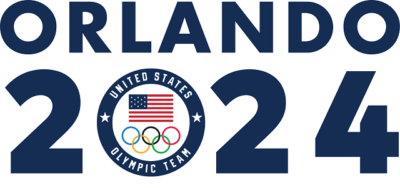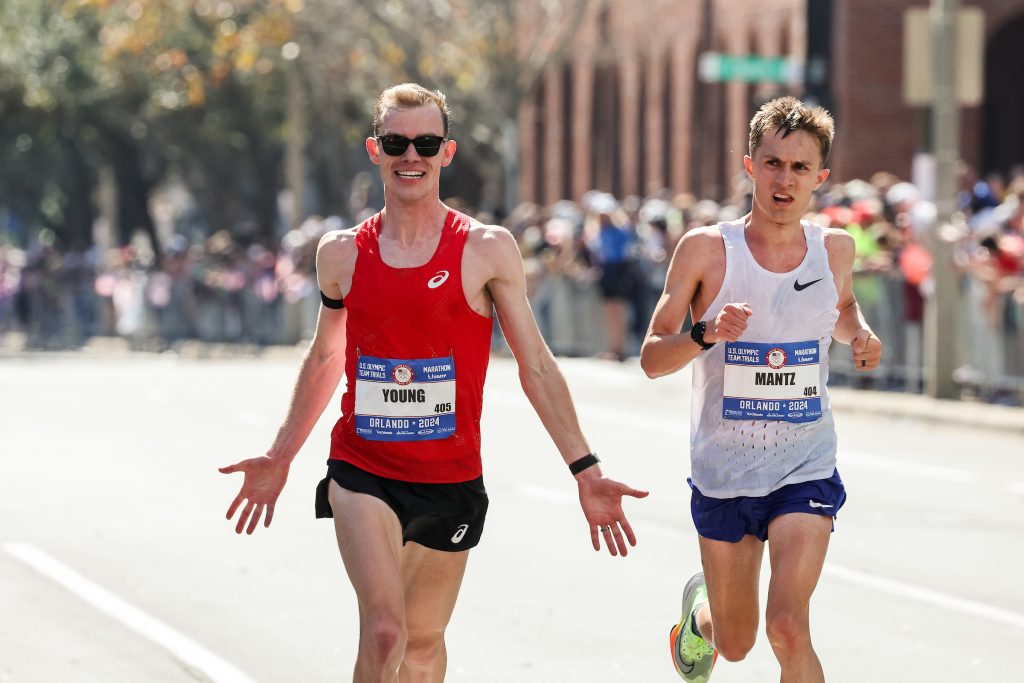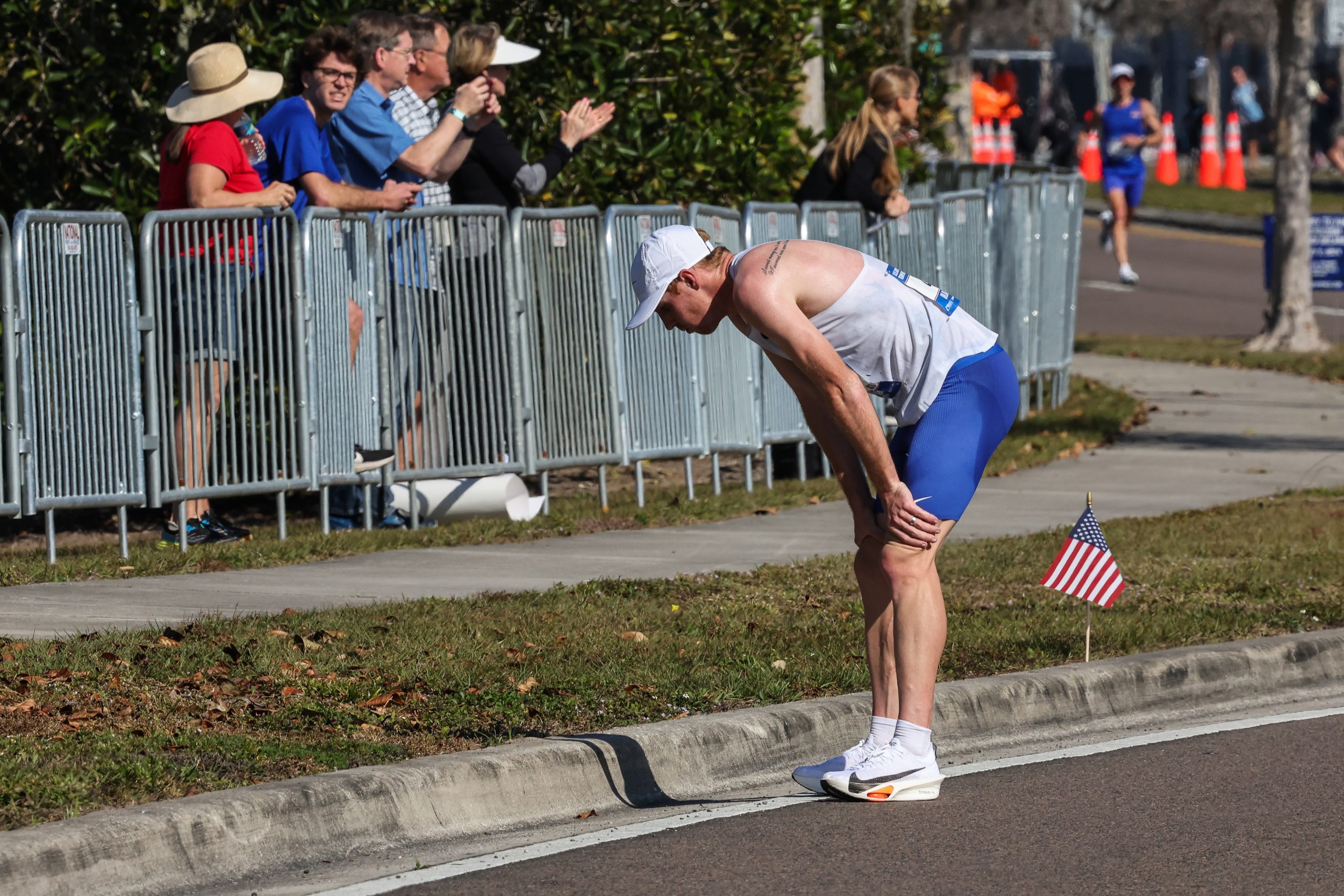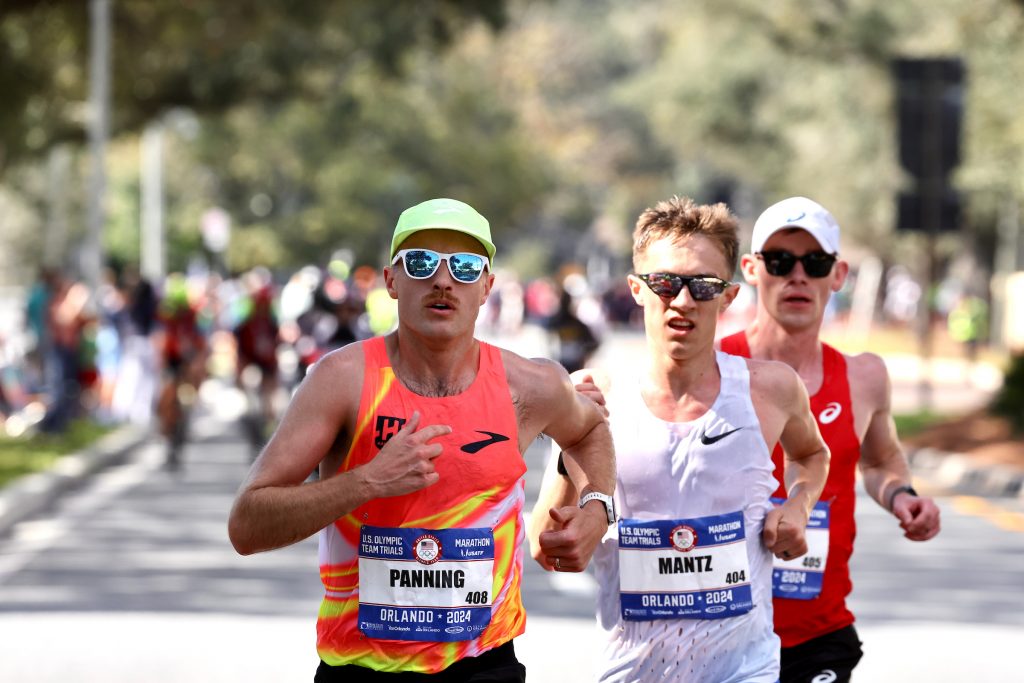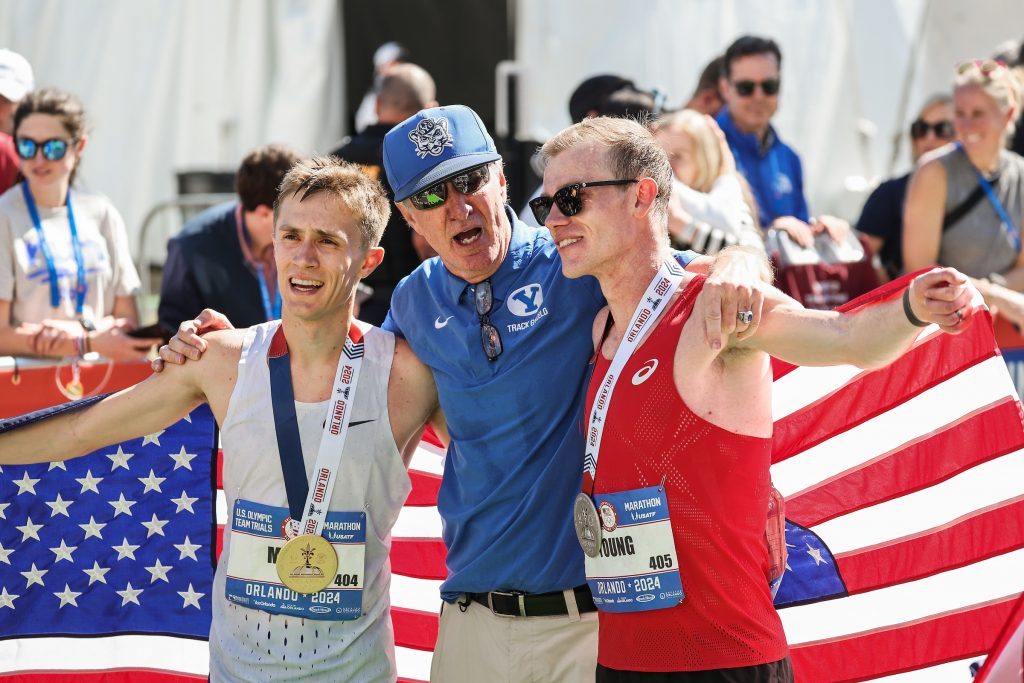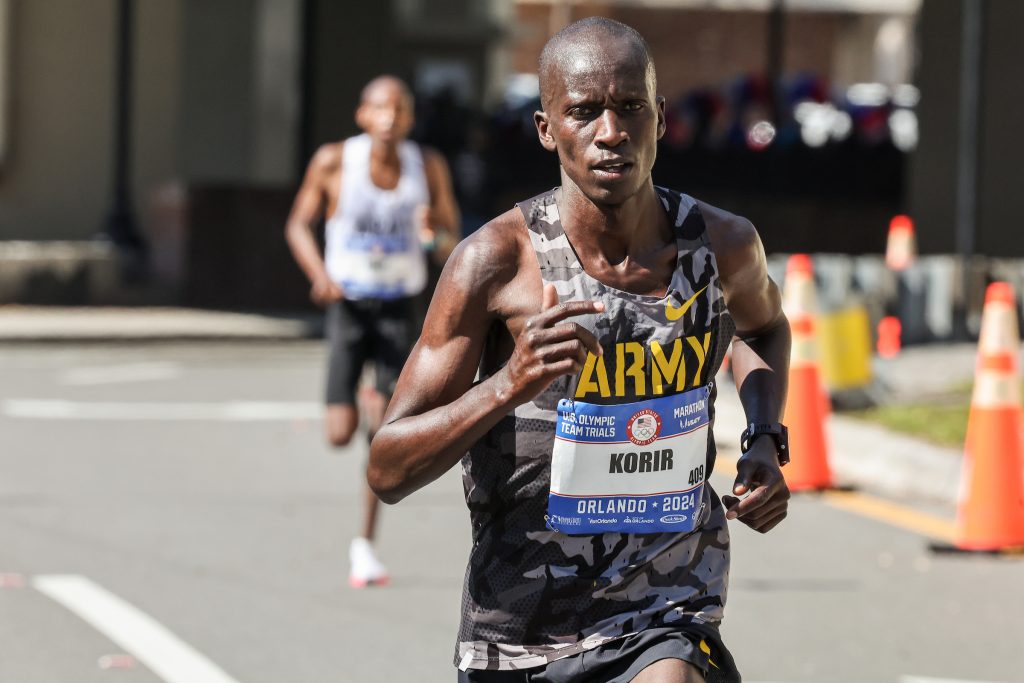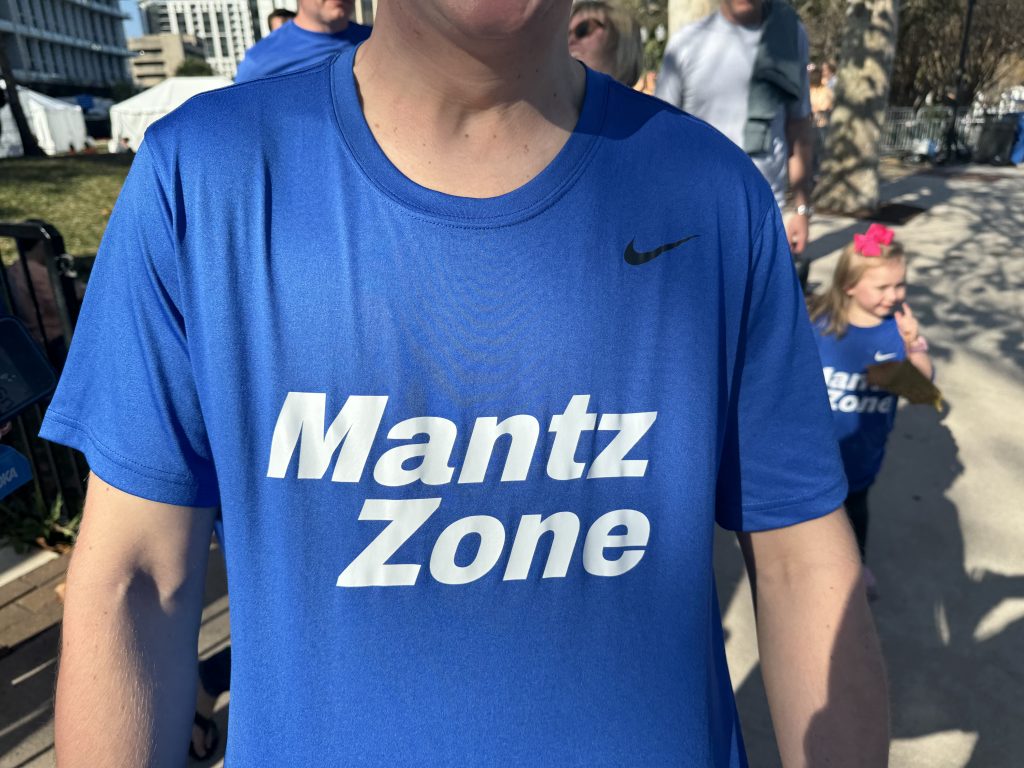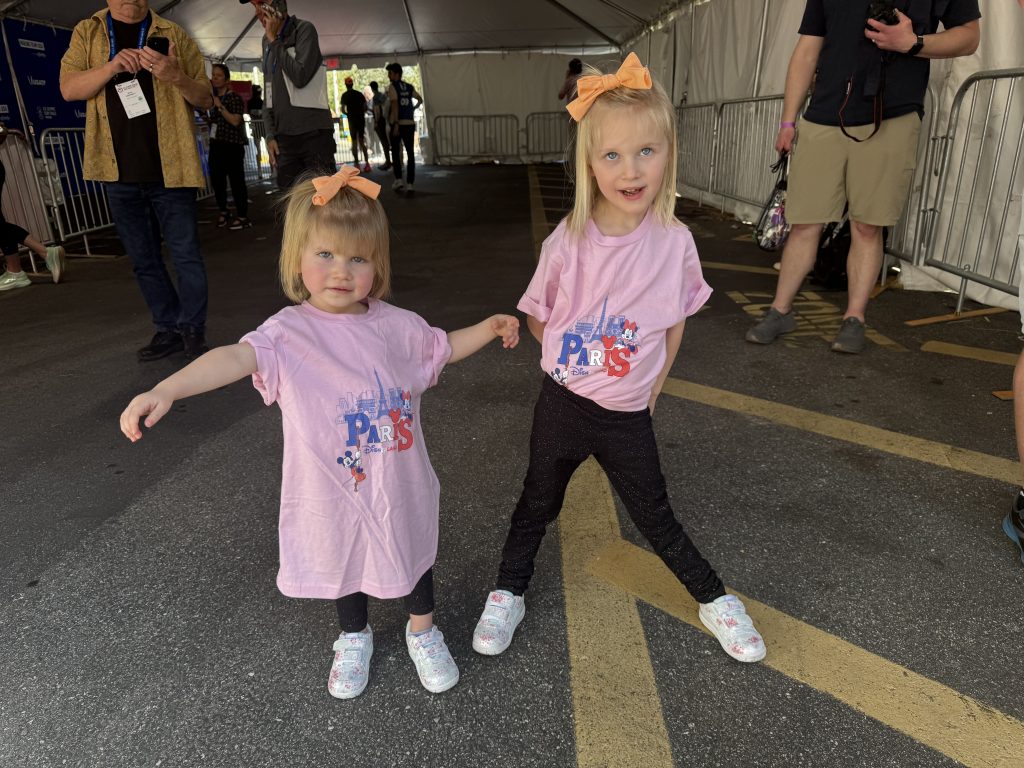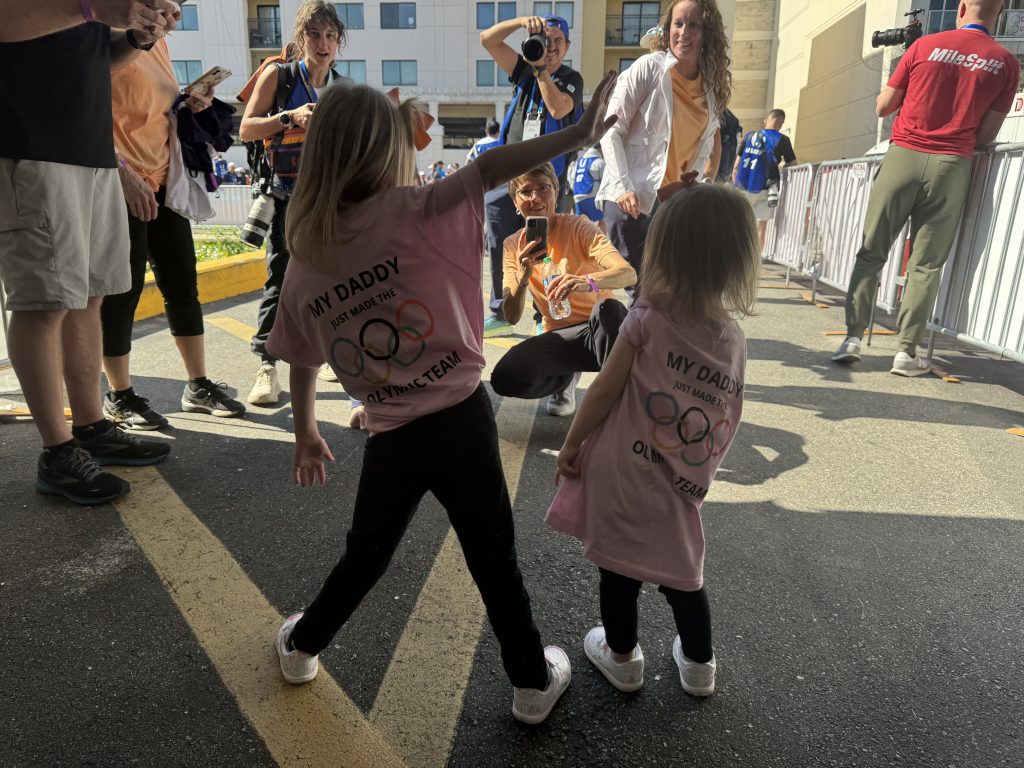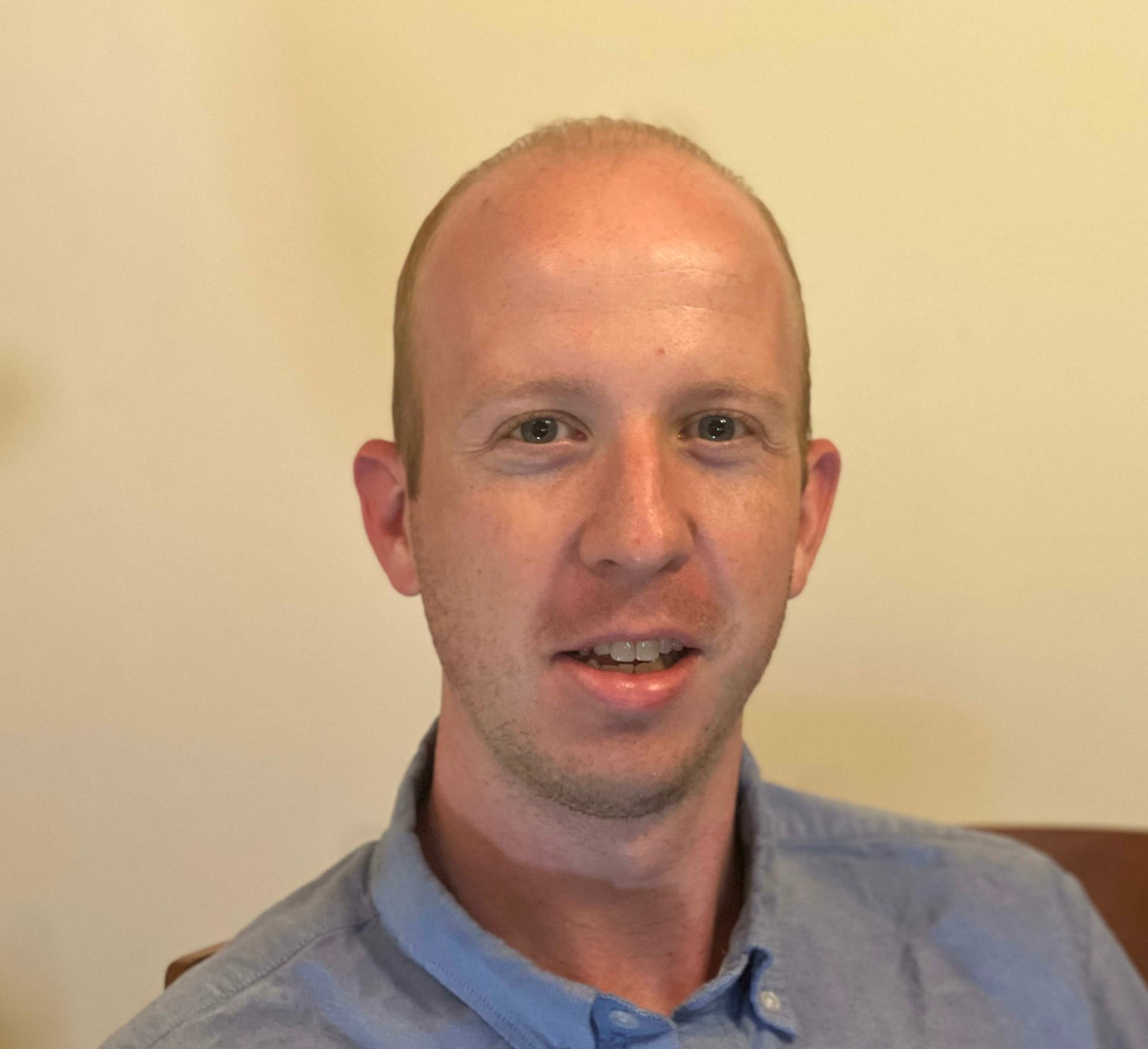2024 US Olympic Marathon Trials: Conner Mantz & Clayton Young Go 1-2 as Leonard Korir Rises from the Dead for 3rd
Korir was 37 seconds out of 3rd at 24 miles but passed Zach Panning & Elkanah Kibet in the final mile
By Jonathan GaultORLANDO, Fla. – They prepared by reading Meb Keflezighi’s book, parsing its pages for advice from the three-time Olympic marathoner and 2004 bronze medalist. They have been coached for the last decade by Ed Eyestone, a two-time Olympic marathoner himself, who told them, in one last piece of pre-race advice, to “chill, cover, close.” For so long, Keflezighi and Eyestone were role models for Conner Mantz and Clayton Young, examples to follow.
Now they are peers. Olympians.
After 26.2 miles of racing on a warm, sunny morning in the Sunshine State, Mantz and Young earned the first two spots on the 2024 US Olympic track & field team by going 1-2 at the US Olympic Marathon Trials. Running beside each other for the majority of the race, the two broke free of Zach Panning of Hansons-Brooks Distance Project with three miles to go and would stay together until the final meters, when Young stood aside, allowing Mantz to break the tape in 2:09:05 to Young’s 2:09:06.
It was fitting that Mantz, 27, and Young, 30, college teammates at Brigham Young University who still train together in Provo, Utah, are the men who will represent the US in Paris. They are the only two men to have bettered the 2:08:10 Olympic standard during this qualifying cycle; without them, the US would have zero guaranteed spots for Paris.
Leonard Korir, 37, who was 4th by an agonizing three seconds at the 2020 Trials in Atlanta, looked destined for another near-miss at the 25-mile mark as he crossed in fifth place, 18 seconds behind Panning. But Panning, who had heroically pushed the pace for more than 17 miles, was melting down and Korir would pass both him and 4th placer Elkanah Kibet by the finish to seal third in 2:09:57. Unlike Mantz and Young, Korir’s Olympic spot is not guaranteed; it is contingent on the US earning another spot via the Road to Paris list and will not be officially confirmed until May 5.
The 40-year-old Kibet was 4th in 2:10:02, with CJ Albertson, who had the fastest 26th mile in the field at 4:58, closing hard for 5th in a pb of 2:10:07. Panning wound up 6th in 2:10:50. A number of pre-race favorites struggled as Galen Rupp, chasing a record-tying fifth Olympic berth, was 16th in 2:14:07. Scott Fauble dropped out before 10 miles after battling stomach issues (he DNF’d his last race in Berlin for a similar reason) while two-time Olympic 5,000 medalist Paul Chelimo dropped out in his debut during mile 18.
Top 10 *Full men’s results
1. Conner Mantz 2:09:05
2. Clayton Young 2:09:06
3. Leonard Korir 2:09:57
4. Elkanah Kibet 2:10:02
5. CJ Albertson 2:10:07
6. Zach Panning 2:10:50
7. Nathan Martin 2:11:00
8. Josh Izewski 2:11:09
9. Reed Fischer 2:11:34
10. Colin Bennie 2:12:17
The Race
For most of Saturday, this was Zach Panning’s race. After a massive pack of men hit 5 miles in 25:05 (2:11:31 pace), the 28-year-old Panning, who was 13th at last year’s World Championship marathon in the brutal heat of Budapest, dropped a 4:49 sixth mile and the game was on.
In a bold display of front-running, Panning, who had logged some incredible workouts in his buildup, tried to grind the rest of the field into submission, and for more than two hours, it appeared to be working. For the 15-mile stretch from 5 miles to 20 miles, Panning averaged 4:49/mile (2:06:17 marathon pace) and did not run a single mile slower than 4:53. He passed halfway in 64:07, and by 15 miles (1:13:17) Panning was at the front of a group of eight men, all of whom were under the 2:08:10 Olympic standard pace. It looked for a moment that Scott Fauble’s pre-race prediction might come true and that someone would unlock the third guaranteed Olympic spot in Orlando.
Panning was rolling and his 4:43 17th mile was the fastest of the race and enough to break Galen Rupp, who would fall behind and struggle home. Teshome Mekonen, Andrew Colley, Nathan Martin, Korir, and Kibet would quickly follow suit, and by 19 miles, Panning had shaken everyone but Mantz and Young.
But as the runners entered the third and final eight-mile loop, which offered little shade, Panning soon began to feel the heat. (It did not help that he dropped his final drinks bottle). The temperature would rise over the course of the race from 63 at the 10:10 a.m. start to 72 degrees by the finish, and Panning showed his first crack with a 4:59 21st mile during which he began to grimace. Mantz and Young edged ahead while urging Panning to hold on, but all three would slow to 5:07 for 5:06 for their next two miles. Panning finally broke during mile 24, splitting 5:28 to Mantz/Young’s 5:09.
Meanwhile, Kibet was charging with a 5:14 mile of his own. He trailed Panning by 24 seconds at 24 miles but a 5:28 25th mile by Panning and a 5:07 by Kibet narrowed the gap to just three seconds and Kibet would make the pass into third early in the 25th mile. Panning’s 2024 Olympic marathon dreams were over.
There were two big questions remaining: who would win between Mantz and Young, and would Kibet hold on for third?
If you were looking for an all-out battle between the two training partners for the win or wondering if maybe they’d purposely cross the line together holding hands, you were disappointed as you got neither.
Up front, Young was celebrating down the homestretch and interacting with the fans while Mantz just kept running straight for the line. Young afterwards said he was content to cross the finish line together, but when Mantz put in a late surge just before the line, Young did not answer it, with Mantz claiming the title of US champion (and an extra $15,000 in prize money).
Kibet, who led Korir by 15 seconds at 25 miles, looked to have the third spot sewn up, but Korir suddenly became determined not to finish 4th for the second Trials in a row. Korir ran his 26th mile in 5:08 to Kibet’s 5:24 and would hold him off in the final stretch to claim third by five seconds.
At 24 miles, Korir was 37 seconds out of third and said he had given up hope of making the team. But as he saw Panning and then Kibet begin to fade, he smelled blood and went in for the kill, crediting the crowd for giving him the energy he needed to hunt them down.
“They were coming back to me,” Korir said. “I knew everybody was feeling the same as me…When [the fans] were screaming and cheering, I got some extra energy. It was like a superpower of track & field…It’s so amazing. Thank you to the organization who made the course this way. I wish they had more races like this one. That was the turning point for [me] to finish 3rd.”
Post-race interviews and analysis
Conner Mantz and Clayton Young are the class of US marathoning and showed it once again today
Four months ago in Chicago, Mantz and Young finished well ahead of a deep US field to run the two fastest times by American marathoners in this Olympic cycle (2:07:47 for Mantz, 2:08:00 for Young). In some countries, that would have been enough to put them on the Olympic team, but the US has used an Olympic Marathon Trials since 1968. Mantz and Young may have unlocked the Olympic spots, but to earn them, they would have to repeat their Chicago performance.
That is exactly what they did. Their coach Ed Eyestone assigned many of the same workouts as before Chicago, with Mantz and Young completing them even faster this time around. And once again, they showed their greatness once it came time to race, outlasting all comers to go 1-2.
About that finish…
With a couple of miles to go, Mantz was starting to struggle a bit. This came as something of a surprise given Mantz beat Young in Chicago and typically runs faster in workouts. But rather than break away for individual glory, Young elected to stay with him to the finish line.
Young said with a couple of miles to go, “[Conner] said, ‘I’m not feeling very well,’ and so I just said, stick right on me, stick right on me.”
“Even though I might have been feeling better, I just wanted to take every step of the way with Conner over the last couple miles,” Young said. “That’s how it worked out. I wouldn’t change it for the world. Conner is the guy who has pulled me this entire build day-in and day-out in practice. He works hard and he deserves this just as much as I do.”
That approach allowed Young to soak up the moment as much as possible. Similar to Ryan Hall at the 2008 Trials in Central Park (except for the fact that Hall had a huge lead), Young threw his arms up repeatedly throughout the final mile, asking the raucous Orlando crowd to pump up the volume. In the final straight, Young peeled off to the side in search of an American flag to wave on his way home, an idea he got from reading Meb Keflezighi’s book 26 Marathons. But he came away empty-handed and had to cross the line flagless. It was Young’s only wrong step all day.
The finish was reminiscent of last year’s US 20k championships in New Haven, Conn., where Mantz and Young were clear of the field and Mantz appeared to let Young win. This time, the tables were turned.
“He let me win the 20k, I let him win the Olympic Trials marathon,” Young said. “It all washes out at the end. I know that people will look at our 1-2 punch in New Haven as well here as a team success.”
Mantz said there was no spoken agreement in Orlando. Just before the line, Young turned to say something to Mantz, but Mantz said it was too loud to hear anything and he was hurting too much to think of anything other than getting to the line as quickly as possible.
“He was talking, I was like, I have no idea what you’re saying,” Mantz said. “I’m like, I’m just trying to finish, I’m going to collapse.”
Clayton Young’s unique cooling strategy: frozen hats in drink bottles
Young trained for the Trials in snowy Utah and prepared for the heat of Orlando by hopping in the sauna after runs. And on race day, he unveiled a unique strategy: frozen hats hidden within his drink bottles, similar to how Galen Rupp was handed hats with ice packs in them at the 2016 Olympics in Rio.
The rules state athlete bottles can be up to 3 ⅜ inches in diameter and 12 inches tall. Young found a set of wide, 10-inch tall stainless steel bottles. Within those, he stored a smaller bottle containing his usual drink mix, as well as a frozen hat. So when Young took a bottle, he’d flip off the cap, replace his hat with a cold, fresh one, and then grab his smaller bottle to drink from.
“I promise it’s within the rules,” Young said.
He admitted he was not sure how much it helped but followed the routine until the final miles, tossing his hat off once he was confident he was going to make the team.
(Editor’s addition: The hat was no longer frozen as they had to turn in their bottles 19 hours before the race but it was still cool)
A day to remember for Ed Eyestone and BYU
BYU coach Ed Eyestone has had plenty of great days in his life in running: winning the NCAA individual cross country title, making two Olympic teams in the marathon, coaching the BYU men to an NCAA XC title. All special in their own way, and now they are joined by February 3, 2024, the day Eyestone coached Conner Mantz and Clayton Young to a 1-2 finish at the Olympic Trials.
“This is going to go down as one of the all-time great days,” Eyestone said. “Obviously, the day I got married, the day my six daughters were each born, and days when you get guys on the Olympic team and they go 1-2 with a lot of pressure.”
Mantz was heavily recruited out of high school but said the reason he chose BYU was that Eyestone not only had a track record of coaching success but had accomplished the same goals Mantz had set for himself: win an NCAA individual title and make an Olympic team.
“He’d done everything that I wanted to do,” Mantz said. “So Following in his footsteps has been pretty special.”
Leonard Korir is now the #3 ranked American in the Road to Paris list in 68th overall
Korir will have to wait three months to learn his Olympic fate. The top 64 men on the list as of January 30 have already been offered spots (technically those spots are awarded to their federation), with the remaining 16 athletes in the 80-man field determined by the final Road to Paris list on May 5.
Currently, Korir is in a good spot. His 2:09:57 today is worth 1191 ranking points (1161 for the time, plus a 30-point bonus for finishing 3rd). Averaged with his 1182 points from last year’s Paris Marathon, Korir now has a ranking score of 1186 points, which moves him into 68th place on the rankings (that’s ahead of the previous #3 American, Scott Fauble, who was 69th entering today).
So for Korir not to make it to the Olympics, he will need 13 men to pass him in the next three months. There are still fast marathons to come in Seville, Tokyo, and London, but anyone who passes him (either by earning the standard or improving their world ranking) must come from a country that does not already have three qualified athletes. Most top countries already have three.
Korir can also improve his ranking by running a fast half marathon. If he recovers well, Korir could theoretically run a spring marathon and hit the Olympic standard, but USATF’s policy on this specific scenario is unclear. We reached out to USATF for communication and will update you once we hear back.
Elkanah Kibet was an unusually happy 4th place finisher
Usually if you miss an Olympic marathon team by five seconds, you are going to feel upset over what might have been. Not Elkanah Kibet. The 40-year-old, who works a 9-to-5 job in the US Army as a financial comptroller at Fort Carson in Colorado, was very proud of what he was able to accomplish today. And he says he’s not done – he wants to run the 2028 Trials at age 44.
“Soldiers, we never quit,” Kibet said. “I’ll be back strong. 2028.”
Zach Panning deserves praise for running an incredibly gutsy race
If Panning, an alum of DII Grand Valley State, had held on to get the win in under 2:08:10, it would have gone down as one of the all-time great Olympic Trials stories. In need of the standard, Panning took it to America’s best marathoners and by 20 miles had broken almost all of them. It was an incredibly brave race, and Panning was still in position to make the team with 1.2 miles to go.
Unfortunately for him, he had miscalculated his effort and wound up running 5:28 and 6:03 for miles 25 and miles 26.
“This was my first Trials and inexperience maybe showed a little bit,” Panning said. “But I’m really proud of how I raced…I’ve done a lot of training, a lot of workouts by myself and I felt like I was ready to run from the front for a good chunk of it. Just ran out of legs last couple miles there.”
Panning said that while he wanted to run aggressively, he did not plan to go to the front quite as early as he did (during mile 6). The warm weather was always going to make it hard to hold 2:07 pace toward the end, so perhaps waiting a little longer would have proved the difference. But hindsight is 20/20. These teams are hard to make, and Panning put himself in the mix until the very end. He just came up a little short.
CJ Albertson flies home to 5th place
Albertson, who was 7th at the 2020 Trials, is known for running near the front in the Boston Marathon, including the memorable 2021 edition when he opened up a two-minute gap at halfway. But today, he came from behind and had the fastest 26th mile of anyone in the field at 4:58. It took Albertson a while to realize how close he was to making the team at the end – he only missed out by 10 seconds.
Additional Quick Takes by Robert Johnson
It was a family affair for Clayton Young, Conner Mantz and many others
One of the best parts about the Olympic Trials is always the crowds. If you are a runner and you make the Trials, often your family, friends and fans (if you have them) will figure out a way to make it out to support you.
And that was certainly the case in Orlando as the crowd size and noise was super impressive. We don’t have permission to share the videos we took from the press truck but it seems like even the fans at home realized the crowds were super loud.
@peacock The audio needs to be fixed on the marathon trials. The music and crowd is louder than @karagoucher. Can barely hear anything. Even the closed caption says “inaudible.” #MarathonTrials pic.twitter.com/8uH59AWztW
— Alyssa Lotmore (@AlyssaLotmore) February 3, 2024
Conner Mantz had a huge cheering section wearing “Mantz Zone” t-shirts.
Clayton Young also had a huge cheering section as his wife, parents, five of his six siblings, and many others were all decked out in pink Asics tshirts.
His two daughters, Jenna (5) and Lucie (3) win the award, however, for most prepared, though. They clearly had total faith in Dad and weren’t afraid of any jinxes as they showed up in the mixed zone wearing shirts that said “My Dad just made the Olympic Team.”
Clayton’s mom, Kelly, however did hold back this time in planning ahead. Four years ago, she had already purchased plane tickets and reserved an Airbnb for Tokyo. After an injured Young finished 136th, she was unable to get all of her money back so she didn’t book ahead this time for Paris.
Kelly, as well as Clayton’s dad Kyle, said Clayton fell in love with running at the age of 9 when an elementary school teacher started a Mileage Club — referring to how much you could run around the blacktop. Results were posted every day and Clayton got really into it as he was battling his friend for #1 honors. In the end, Young ended up second as he had to bow out after his sister’s horse kicked him in the face, but he was hooked on running.
Is Galen Rupp done?
After seeing Galen Rupp in Chicago in the fall and fade today to a 16th place finish, many may assume that Galen Rupp is done. After all, he’ll be 41 when the next Trials happen in 2028. Well let us remind you that Meb Keflezighi missed the Olympic team in 2008 when he would have been 33 at the Games, but he competed in two Olympics after that at age 37 and 41.
Similarly, Abdi Abdirahman made the Olympics in 2000, 2004, 2008, and 2012 before missing out in 2016 at age 39. He amazingly made the 2020 Olympics at age 43.
Normally when you miss an Olympic team that you have a good shot of making, you don’t make the next one as you are older and not as good. But history has shown us that supreme talent — and Rupp certainly qualifies — can afford to skip a Games and sometimes still make it back.
Rupp was in rough shape at the finish and had to be supported as he left the finish area but did return to speak in the mixed zone.
Galen Rupp pukes at the finish of the Olympic Marathon Trails pic.twitter.com/PBBTjSXoxc
— Joseph Fuller (@justrunfuller) February 3, 2024
Talk about the race on our world-famou fan forum / messageboard:
- On the boards: The Official 2024 US Olympic Trials Orlando ‘Thon Live Thread
- Did Young let Mantz Win?
- Where’s the love for Fiona O’Keefe?
- Zach Panning… American Hero
- DAKOTAH MF LINDWURM
- How does Albertson get in?
- GALEN RUPP APPRECIATION THREAD
- Clayton YOUNG will win Olympic Bronze
- JESS (TONN) MCCLAIN IN 4TH
- Why did Scott Fauble DNF?
- Where did Jenny Simpson finish?
- How about some love for the last place Olympic Trials finishers!
